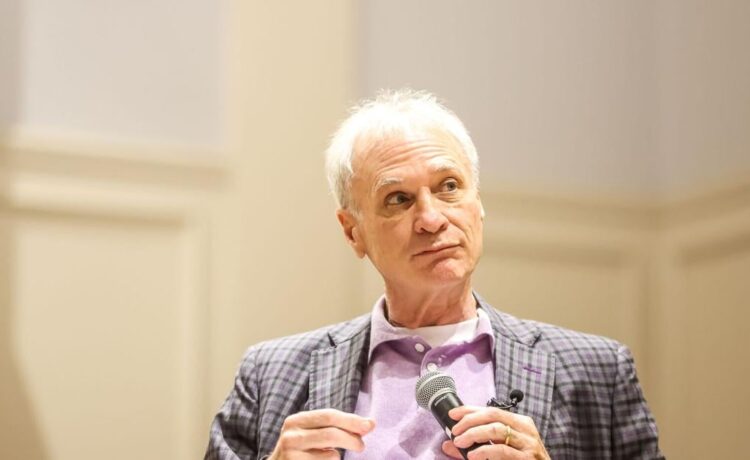A Tulsa city councilor and mayoral candidate is proposing to prohibit the use of city funds, either directly or indirectly, to “house, accommodate, or benefit illegal immigrants.”
The proposed ordinance from Jayme Fowler defines city funds as any money under the city treasurer’s control, including but not limited to tax revenues, grants and subsidies.
The proposed prohibition would apply to all city departments, city contractors, city employers and nonprofits. Nonprofits and programs found to be in violation of the proposed ordinance could have their funding withheld.
The ordinance defines an illegal immigrant as “any person residing in the United States who does not possess legal documentation or authorization to reside in the United States.”
People are also reading…
Fowler listed three reasons he proposed the ordinance.
“No. 1 is that we’re barely able to address our unhoused citizens here in the city of Tulsa,” Fowler said. “And then No. 2 is that, literally, one or two busloads of illegal immigrants would max out our low-barrier shelter.
“We just don’t have the capacity and scale of major cities like New York and Denver and Chicago. We really don’t have those resources.”
The third reason, Fowler said, is to staunch any misinformation or misperceptions that Tulsa is a sanctuary city. Fowler noted that a conservative news outlet portrayed efforts by city leaders to create a more welcoming city as making “the city a more desirable destination for illegal migrants.”
“You can tell people so many times that that’s not true,” Fowler said. “But if you just simply lay down in an ordinance and let people know that we are not a sanctuary,” that would help.
A sanctuary city is generally defined as a municipality that does not cooperate with or limits its cooperation with the federal government in enforcing immigration laws. Tulsa has never been designated as such a city.
Mayor G.T. Bynum said he has not discussed the proposal with Fowler but agrees with the sentiment behind it. He added that the city complies with federal immigration laws and has strongly supported opportunities for lawful immigrants in Tulsa.
“I do not want us doing anything that rewards those who cheat the system,” Bynum said. “We honor the sacrifices made by lawful immigrants who seek opportunity in Tulsa and are doing so much to be a city that lives up to their hopes and aspirations. This proposed ordinance isn’t going to change that.”
Bynum said his main concern is how the ordinance is drafted.
“From a practical standpoint, everyone in Tulsa benefits from basic infrastructure and services funded by the city government,” Bynum said. “I can’t imagine that Councilor Fowler plans to check the immigration status of every person before they flush the toilet or drive down a street.
“If a person calls 911 because someone is trying to murder them, the Tulsa Police Department isn’t going to check their immigration status before stopping the murderer. If a person has a heart attack, the Tulsa Fire Department isn’t going to check their immigration status before saving their life.”
Bynum said those are just a few examples of why the current wording of the ordinance is not enforceable.
“And I would not want us setting a legal expectation that we have no means of enforcing,” he said.
The city relies heavily on nonprofits to provide food, shelter and other social services to the homeless and immigrants making their way into the country.
Asked whether his proposed ordinance would mean shelters and feeding programs would have to check an individual’s immigration status before assisting them, Fowler said he did not know the mechanics of how that would work.
But he added that there are nonprofit service providers locally that are not funded by city dollars that could provide housing to immigrants without proper documentation.
Nearly all of the money the city provides to nonprofits working on homelessness comes in the form of federal pass-through dollars.
Becky Gligo, outgoing executive director of the nonprofit Housing Solutions, said federal funding for housing and shelter are subject to anti-discrimination provisions and the federal Fair Housing Act.
“Homeless services are designed to meet the immediate needs of all and ultimately permanently house all Tulsans,” Gligo said. “We will continue to focus on these goals.”
Fowler said he plans to discuss whether those funds would be prohibited — and other questions surrounding the proposal — when councilors discuss it on Wednesday.
“The finished product could be far different than what you looked at (Friday) afternoon,” Fowler said.
The new Tulsa World app offers personalized features. Download it today.
Users can customize the app so you see the stories most important to you. You can also sign up for personalized notifications so you don’t miss any important news.
If you’re on your phone, download it here now: Apple Store or Google Play
A look at the 2024 Tulsa mayoral race.
The filing period for the city’s municipal elections is not until June. But three candidates have said they’re running: City Councilor Jayme Fowler, County Commissioner Karen Keith and state Rep. Monroe Nichols. The candidates are vying to succeed Mayor G.T. Bynum, who is not seeking a third term.














